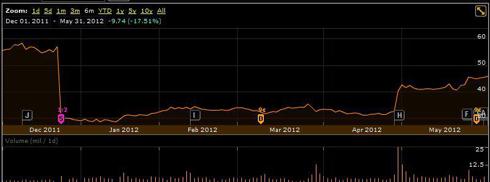You don't have to be a technical trader to understand fundamentals, to have intuition, to have that "gut" instinct about where certain industries and companies in the economy are headed.
To begin, long anticipated RoomSurge.com finally launched into public beta this week following an extensive testing period in their private beta session with over 1000 users, a period that spanned from January 2011 through May 2012.
RoomSurge, partnered by affiliation with Expedia, Hotels.com, andTripAdvisor, claims to be "a super smart app that delivers millions of unsold rooms that hotels want to fill for the cheapest negotiated rates in every city in the world."
They play on the philosophy that an oversupply of unsold rooms means the lowest possible rates for consumers. This way, everybody wins. Throughout the year, they frequently release perks for their users like the current 20% off hotel food delivery deal on their website.
According to Northwestern University's Medill School of Journalism, Expedia had a 42.7% market share in 2009, with $21 Billion in gross bookings. The second contender, Orbitz, only came at a 19.6% market share. (http://news.medill.northwestern.edu/chicago/news.aspx?id=151263) That marketshare figure is the key.
In addition, according to Expedia's SEC filing (http://www.expediainc.com/secfiling.cfm?filingID=1193125-12-50009&CIK=1324424), they own or are partnered with the brands Hotels.com and TripAdvisor.
The economic theory behind RoomSurge is what its executives coined as the theory of "multiple mashup-synergy", a term that they describe to be "the simple synergestic method of combining the best Web 2.0 services to create a new services of compounded value." In other words, combining what they describe to be the current leaders in online hotel bookings, Expedia, Hotels.com, and the most popular hotel review site TripAdvisor, they create a service that compounds the value of those brands to consumers. Basically it's the same theory as the "rich get richer", that Expedia's domination of the market will help RoomSurge propel its brand and hotel inventory multitudes higher, in a value cycle that gains momentum and value at every turn.
Their theory of "multiple mashup-synergy" can be seen already in the growth of their Twitter followers. According toTwitterCounter.com, RoomSurge experienced exponential growth in followers on Twitter, shooting up from 250 to 1300 in just a matter of days, the days preceding their public launch, and the days after the launch. Clearly here, one can fathom the value of Expedia's brand and inventory.
RoomSurge claims to leverage the power of the best web travel retail to intelligently pick and display rooms that have super discounted prices and last minute rates.
The RoomSurge service itself sports a blazingly fast UI and hotel booking process with special deals for their users sprinkled in, a perk not seen in any of the other competing hotel apps. The founders had done tons of research on current hotel booking companies and filled in all the holes that they did wrong - namely overcluttered interfaces, dropped bookings, horrible customer service at times, and a displeasing interface. They put together an intelligent proprietary interface that connects with Expedia to cut out the clutter and only present the best negotiated room deals.
RoomSurge also sports millions of 3D virtual tours for properties so that travelers can experience the hotel before they arrive, a smart feature they integrated with TripAdvisor. They seem to play pretty well in the customer service category, by leveraging personal treatment for every guest, as seen in their Twitter initiative of following back every customer. As of now they have 1300 followers within a few days of launch. If just 800 of those followers were paying customers who only paid once (although we predict most of the followers are paying customers), and given that the average price of a hotel room in America is $120, that translates to $96,000. At this rate, in half a year, we predict the gross bookings should come close to $1 Million. Hardly a pinch in Expedia's behemoth of $21 Billion gross bookings, but the growth we've seen in such a short period will do anything but drag Expedia's claim to the online travel retail throne.
This trend implies that despite poor macro economic growth in the US and in the world (since RoomSurge also serves international consumers, translating their booking application into over 30 languages), online travel is still strong. It has been hit by the economy, as expected, but nonetheless Expedia is still booking billions a year.
Expedia, made $847.82 million in cash flow last quarter, 16.28% better than the $729.09 million reported last year for the comparable period. When compared to year-over-year growth in 12-month trailing cash flow of 15.14%, the recent quarterly increase represents a slowdown in the company's operating income growth, which is likely to contribute to to lower earnings in coming quarters and pressure the company to cut costs in order to maintain its margins. Even though the company has $1.25 billion in total debt, its net debt is virtually zero since it has $2.02 billion in cash on hand; and since it generated $85.68 million in earnings before interest, taxes, depreciation and amortization last quarter, it's safe to say its liquidity is remarkable.
So go ahead and pick up some Expedia (NASDAQ: EXPE) stock today. It's a solid investment.
Disclosure: I have no positions in any stocks mentioned, and no plans to initiate any positions within the next 72 hours.
